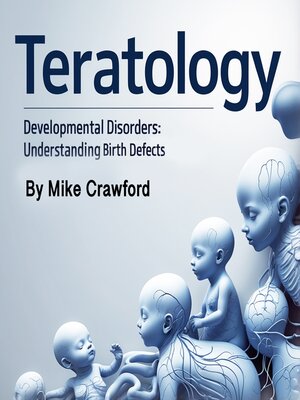Teratology
audiobook (Unabridged) ∣ Developmental Disorders: Understanding Birth Defects
By Mike Crawford

Sign up to save your library
With an OverDrive account, you can save your favorite libraries for at-a-glance information about availability. Find out more about OverDrive accounts.
Find this title in Libby, the library reading app by OverDrive.



Search for a digital library with this title
Title found at these libraries:
| Loading... |
Teratology is the study of congenital abnormalities and the factors that contribute to developmental disorders in embryos and fetuses. Birth defects, which range from minor physical anomalies to severe life-threatening conditions, affect millions of infants worldwide. Understanding their causes, mechanisms, and potential prevention strategies is essential for improving maternal and infant health. Over time, scientific advancements have shed light on the complex interplay between genetics, environmental influences, and maternal health, all of which contribute to fetal development.
The origins of teratology date back centuries, with early theories often rooted in superstition rather than science. However, as medical knowledge expanded, researchers identified specific genetic mutations, environmental toxins, infections, and nutritional deficiencies as key contributors to congenital disorders. Today, a combination of genetic research, prenatal screening, and preventive healthcare plays a crucial role in reducing the prevalence and severity of birth defects.
Birth defects can be classified into several categories, including structural, functional, and metabolic disorders. Structural anomalies, such as cleft lip, spina bifida, and congenital heart defects, result from improper tissue or organ formation. Functional disorders, including neurological and developmental disabilities, affect how the body operates. Metabolic disorders, often inherited, impact the body's ability to process nutrients and chemicals. Each type of defect has unique causes and requires different approaches to diagnosis, treatment, and management.






